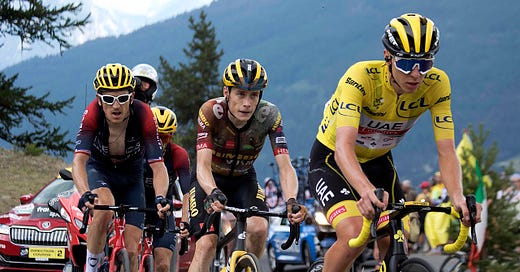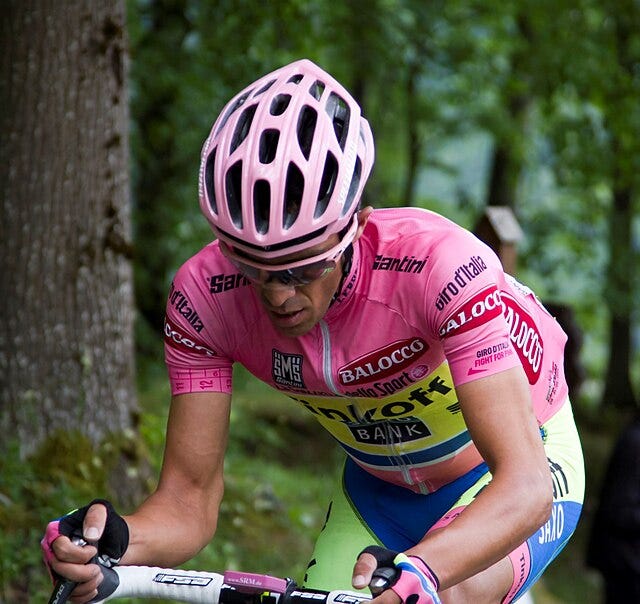Cycling's Tactical Revolution
How game theory is shaping road cycling, featuring an exclusive interview with Patrick Broe Head of Strategy at Visma-Lease a Bike.
Cycling is undergoing a revolution: riders go ever faster, the action starts ever earlier, and we see feats once considered impossible on a daily basis. One aspect of this is the development and usage of far more aggressive tactics. Sending riders up the road, attacking with almost 100 km to go, and pacing climbs to tire out competitors are all tactics that seem to grow in use year on year. This is especially true of teams like Visma-Lease a Bike(formerly Jumbo-Visma) and, more recently, Britain’s own Ineos Grenadiers, who have undergone a tactical revolution this season resulting in more aggressive tactics, exciting racing, but mixed results. In a sport where performance is so important, cycling’s tactical disruptors show both the possibilities and the limits of strategy in a world dominated by power.
Aggressive tactics are not new to cycling. The spring one-day classics have been no stranger to long-range attacks for most of their existence. Furthermore, my childhood was lit up by the daunting raids of Alberto Contador, most notably his mythical ambush in the 2012 Vuelta on a stage so innocuous there was no TV coverage of his moment of attack. However, this was the exception. The previous decade of Grand Tour racing was typified by teams arriving at the final climb of a mountain stage and then perhaps pacing hard for an attack or protecting their GC rider, but not much more. Transitional days were often left to a breakaway of French housewives’ favourites who were forgotten by the peloton for the rest of the day. However, in 2022, some of this began to change.
Before Stage 11 of the 2022 Tour de France Tadej Pogacar seemed invincible. He had won the previous two editions and had a 40 second advantage over his nearest rival Jumbo- Visma’s Jonas Vingegaard. However, a team of Sports directors and tacticians had created a plan to defeat this sporting goliath.
Pogacar had shown one moment of weakness at the Tour the year before, losing Vingegaard’s wheel near the top of Mont Ventoux before catching the Dane on the descent. With this in mind the team at Jumbo-Visma sought to make the hardest stage of that year’s Tour de France as hard as possible to see if they could find any way to break the Slovenia.

They began by getting two of their strong classics riders in the breakaway to act as chess pieces in the games to come. This was followed by one of the more extraordinary spells in the history of modern cycling. Jumbo-Visma’s two leaders Vingegaard and Roglic combined to lure Pogacar away from his team, and then one twoed him all the way up the Col de Galibier. Pogacar responded to everything and ended the climb with Vingegaard on his wheel. As the groups back came together on the descent everyone believed this great gambit had failed.
Indeed, when the peloton reached the final climb of the day the fearsome Col de Granon, Jumbo-Visma’s riders started to fade away and the commentators began to wonder if all had been wasted. However, in reaction to the soft pace of Pogacar’s teammate, Vingegaard launched a stunning attack and the Yellow Jersey couldnt’t follow. By making this already brutal stage as hard as possible they had exposed Pogacar’s one weakness and cracked him. Pogacar lost more than three minutes that day and any hope of riding the Yellow Jersey into Paris.
(Above is a highlights video of said stage made by the tactician behind the great coup.)
However, this tactical masterclass was not concocted by an aged sport director who had seen it all, nor indeed the data scientists so beloved of Twitter tacticos, but by a former corporate lawyer from Melbourne, and his fellow podcast co-host who first came to cycling through a video game.
The two podcasters in question, the former lawyer Patrick Broe and Benji Naesen, hosts of the Lanterne Rouge Cycling Podcast, were unbeknownst to their listeners moonlighting as tactical analysts for Jumbo-Visma, one of the world’s premier cycling teams. Naesen subsequently left the team to focus on his YouTube content, but Broe stayed on and is now a senior decision-maker in the team which won the 2022 and 2023 Tours. This included an unprecedented Grand Tour grand slam in 2023, winning the Tours’ of France, Italy and Spain in the same season with three different riders. He spoke to me a few years ago about his philosophy:
For Broe, “Cycling has focused, particularly in the last ten years, on how to make guys go faster rather than how to win races.” His approach comes from his exposure to game theory through online poker. Tactics and strategy are inherent to any sport, but the Australian says his particular approach is new to cycling. “Everything is game theory basically in cycling, and so there must be optimal ways of playing these difficult situations. I think that’s the big novelty.”
His greatest feats—the aforementioned Granon stage and the Col de la Loze stage of 2023—relied on a great coup which obliterated the race. In 2023, the infernal pace of the stage and his imperfect preparation for the Tour following a crash led to Pogačar cracking early on the slopes of La Loze, muttering the immortal words, “I’m gone. I’m dead,” into race radio. For Broe, these great moves are inherent to his poker-derived tight-aggressive strategy:
“Tight aggressive is, by definition, passive, passive, passive—try and knock the other guy out. As opposed to taking five seconds, taking ten seconds across a lot of stages.”
Jumbo-Visma, as they were then known, were at the cutting edge of cycling across all domains, from altitude training to sponsorship activation. Perhaps this is why they decided to hire the podcaster. Broe first made video highlights of races which focused on tactical analysis, and so when he was asked by the team to make some for their riders, the transition was easy. Broe credits Jumbo-Visma for taking a chance on him, as “not many teams would choose to spend resources that way”. Of his own role he says:
“Of course, it’s a lot easier to win races with riders who go very fast, but that’s one component of winning races, particularly stage races. I’m not a trainer. I don’t know how to make a cyclist faster. There are many coaches that are excellent at that, and it’s great when they arrive at the race, but you have to have a plan for the race.”
Since I spoke to Broe, his team haven’t won a Grand Tour or a monument (the five biggest and oldest one-day races). This is partly due to bad luck, but also the world-historic phenomenon which is Tadej Pogačar, who developed beyond the key weakness Broe had identified, and won last year’s Tour at a canter. Pogačar’s team has also improved drastically, and is more tactically sound. Being a disruptor is hard, and in the same way Broe’s team Jumbo-Visma took the mantle on from an antiquated team—Ineos-Grenadiers—they are currently outmatched in talent by Pogačar’s UAE Team Emirates.
Ineos themselves have this year had a renaissance. Previously they had been very traditional in their tactics, but their racing this year has been marked by attempts to get riders up the road to act as satellite riders or to take advantage of confusion behind. This has been successful, with Magnus Sheffield winning a Paris-Nice stage in spectacular fashion by taking advantage of a group of isolated leaders—but also controversial.
At Liège–Bastogne–Liège, they attacked extremely early to try and put pressure on the prohibitive favourite, Pogačar’s team. The logic being that even a move which was destined to fail from their C-tier riders would use up Pogačar’s team and make the defending champion more vulnerable in the final. This plan failed miserably, as not only did no other teams join them in the attack, but they helped Pogačar’s domestiques chase them down. Pogačar would go on to win the race easily, soloing away for 30 km.
In a race with 20 other teams, such tactics might fulfil Broe’s game theory, but they can look foolish if you are the only one who sees the sport in this new light. Old-timers such as Sean Kelly, the Irish legend, criticised Ineos on TV commentary, and on X, Johan Bruyneel (Lance Armstrong’s sports director and team manager) vented about the "PlayStation tactics” of the younger generation. Much of Bruyneel’s irritation with this new wave probably stems from his unfair lifetime ban for being associated with Armstrong, when other doping-adjacent sports directors continue to work in the sport—including Pogačar’s team principal, Mauro Gianetti.
This new wave of disruptive tactics relies on an understanding of each team as having a video game–like fixed amount of resources they can spend, irrespective of the realities of the suffering and pain imposed by a race—particularly a three-week-long Grand Tour. In this respect, Bruyneel may be on to something. But in the face of an athlete like Pogačar, old dogmas cannot hold if teams actually want to win. Nevertheless, as younger fans and riders grow up in an age of disruption, we will begin to see more and more of this innovative thinking. As Broe’s philosophy spreads across the peloton, we could one day see a complete break from the traditional patterns of racing. Cycling’s tactical revolution is not over—in fact, it is only beginning.





